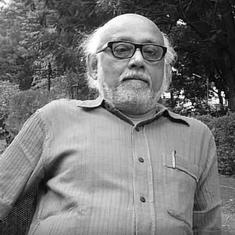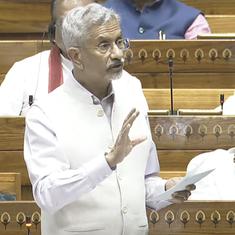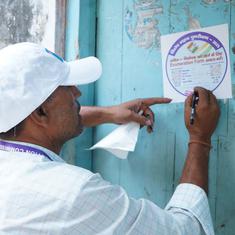On a rainy July afternoon, Jainarayan Lalkaran, 65, sat in a chair at the Malviya Nagar Post Office in Delhi, facing a cubicle dedicated to Aadhaar matters, from enrolment to making changes in the biometric-based ID. A thick glass wall separated the man minding the cubicle from Lalkaran and 22 other people before him in the queue.
It was Lalkaran’s third visit to the post office in as many months. He had not been getting his Rs 2,000 monthly pension under a Delhi government scheme for senior citizens. Every time he went to the pension office, the biometric machines there failed to authenticate his fingerprints from the Aadhaar database. Since verification through biometrics was mandatory for the pension office to initiate the transfer of his pension amount to his Aadhaar-linked bank account, he was turned back every time.
By late afternoon, the official at the post office had signed a note verifying Lalkaran’s Aadhaar biometrics – fingerprints and iris scans – and stating the mismatch could be because of “technical issues”. Lalkaran, who drives a taxi for a living, returned with some hope of finally getting his dues.
The old age pension is available to every senior citizen who has lived in Delhi for at least five years and has a family income of Rs 1,00,000 per year or less. It is currently availed by over 4.28 lakh senior citizens, and many of them would have heaved a sigh of relief when the government decided to delink the scheme, along with pensions for widows and disabled persons, from Aadhaar on July 31. According to the social welfare department, as many as 33,191 beneficiaries such as Lalkaran were not receiving the pension, mainly because of Aadhaar authentication failures.
Lot of people suffering due to inability of banks to link adhar wid bank account. Today, Cabinet decided to delink adhar from widow n age old pension
— Arvind Kejriwal (@ArvindKejriwal) July 31, 2018
The Delhi government’s decision has triggered a debate about its wisdom, and many people are asking whether it will delink more social welfare schemes from Aadhaar?
That will be determined by two factors, senior government officials said.
First, the funding model of the schemes. The Delhi government can take a decision only about schemes that it invests more money in than the Centre. It could delink the old age pension from Aadhaar on its own because as against the Centre’s contribution of Rs 34 crore a year to the scheme, the state provides Rs 1,100 crore. Similarly, the pension scheme for disabled persons, which benefits 77,848 people, receives Rs 2.3 crore a year from the Centre and Rs 200 crore from the state.
Second, the Supreme Court is likely to deliver its judgement on the constitutional validity of Aadhaar soon and the government officials speculate it would contain guidelines on using the biometric ID for disbursing welfare benefits. “You never know, the Chief Justice of India can surprise you,” said a senior official who spoke on the condition of anonymity.

‘It could get complicated’
The Delhi government runs 41 welfare schemes, including pensions for the elderly, widows and disabled persons; scholarships for students; assistance to women and children.
Scroll.in found that to avail most of these schemes, beneficiaries must link their bank accounts to Aadhaar or upload their Aadhaar details online as proof of identity. Some schemes, such as the pensions, require biometric authentication as well. The scheme to provide financial assistance for purchasing stationery to members of Scheduled Castes, Scheduled Tribes and Other Backward Classes requires the beneficiaries to submit their Aadhaar number, along with some other documents, as identity proof.
Social Welfare officials said delinking Aadhaar will not cause any problems in the delivery of benefits. They did, however, claim that seeding beneficiaries accounts with Aadhaar had helped weed out duplicate accounts. “If Aadhaar is used just for data management, then it is fine,” said an official. “Sometimes there is confusion about where the beneficiary wants the funds to be transferred. If the account is linked to Aadhaar, then the money goes there. But if Aadhaar is delinked, then we will have to transfer the money to where the beneficiary wants. We have anyway been doing this.”
But if the Supreme Court directs the Centre to draft guidelines for linking Aadhaar to welfare schemes that it provides the majority of the funds for, then it could get more complicated, the official added.
Caught in a tussle
Take the public distribution system in Delhi which has become a source of discord between the Aam Aadmi Party government and one of the bureaucrats working for it. This is being perceived as part of a larger tussle between the city government and the bureaucrats which had kicked off early this year following the alleged attack on Delhi’s Chief Secretary Anshu Prakash by a group of legislators during a meeting in Delhi Chief Minister Arvind Kejriwal’s residence.
In 2017, the state government introduced an Aadhaar-based check system known as the electronic point of sale mechanism, or e-POS, to tackle hoarding by fair price shops in the city. The beneficiaries were required to register their fingerprints while collecting their monthly ration. But widespread technical failures led to chaos, the officials said, and there were allegations of irregularities. So, in January this year, the government decided to do away with the system. Lieutenant Governor Anil Baijal approved the decision and asked for an inquiry by the state police’s Anti-Corruption Branch. The decision came into effect on April 16.
In May, however, Delhi’s food commissioner, Mohanjeet Singh, issued directions to continue e-POS. The Aam Aadmi Party government alleged Singh was working at the behest of the Narendra Modi government. It refused to revive e-POS, even though the public distribution system is funded largely by the Centre.
Last fortnight, the tussle intensified when Singh struck around 2.48 lakh names off the ration card list. The state government said the move will affect nearly 10 lakh people in the city. Singh, however, claimed to have gone by the rule book, cancelling ration cards against which no ration had been claimed for the previous three months after serving notices to their holders. The three-month rule is followed by both the Delhi government and the Centre.
Later, Kejriwal later lashed out at the food commissioner. “Many families would be rendered hungry because of the insensitive attitude of the officers,” he said in a statement. “The recent episode of the unfortunate death of three children in Mandawali due to hunger and non-availability of food is a case in point. It is apprehended that due to illegal cancellation of ration cards such incidents in other parts of Delhi cannot be ruled out for which the Food Commissioner would be personally responsible.”
Kejriwal added that there was a possibility the holders of the cancelled cards were not at fault: they might well have been denied the rations because of authentication failures. To rule out this possibility, the chief minister said, the food commissioner should have done door-to-door checks before cancelling the cards.










